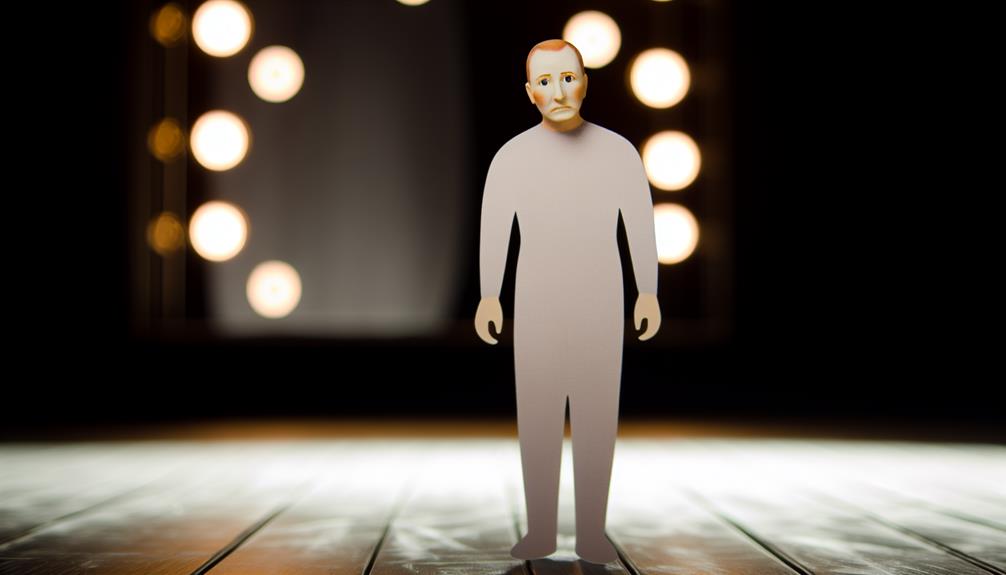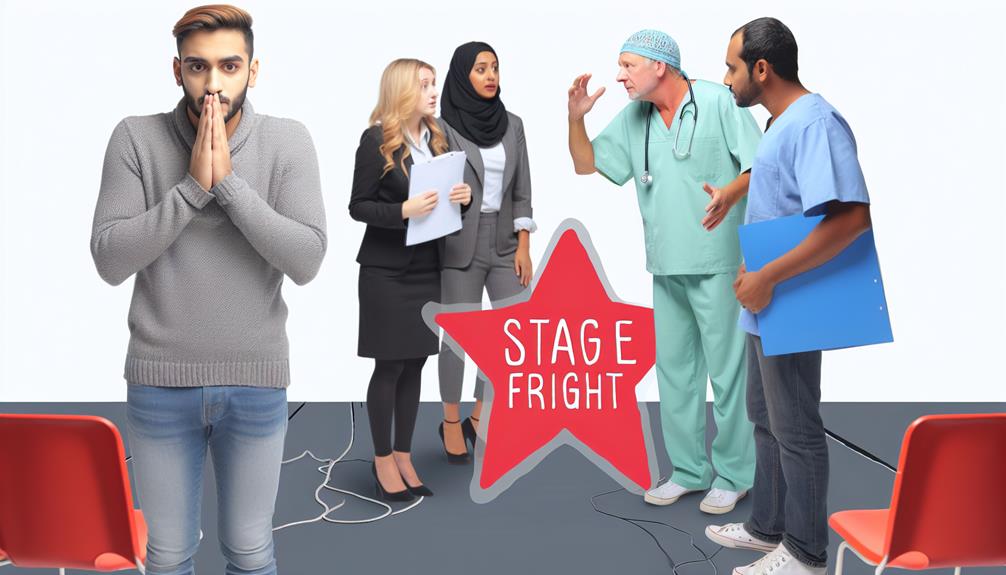Imagine this scenario: you've been invited to speak at a prestigious conference in front of hundreds of professionals from your industry. The mere thought of standing on that stage makes your heart race and palms sweat.
You're not alone. Stage fright affects even the most accomplished performers. But fear not, because in this discussion, we will uncover the key strategies that can help you overcome stage fright and deliver a confident, impactful presentation.
So, if you're ready to discover practical tips, mental preparation techniques, and relaxation methods that will empower you to conquer your stage fright, then keep on reading.
Understanding Stage Fright

Do you ever wonder why stage fright affects performers, even the most successful ones?
Stage fright is a common experience among musicians, actors, and other performers. It's caused by the brain perceiving a threat, triggering the body's natural response to fight, flee, or freeze. However, this natural response can hinder performance and lead to anxiety. It's important to understand that stage fright isn't uncommon, even among successful performers. You aren't alone in dealing with this challenge.
Overcoming stage fright is possible with the right mindset and strategies. One effective strategy is setting a time limit for feeling nervous. Give yourself a few minutes before going on stage to acknowledge and accept your anxiety. Once the time is up, shift your focus to the task at hand and let go of any lingering nervousness.
Practicing practical tips can also help in overcoming stage fright. Breathing exercises, positive self-talk, and visualization techniques can all be effective tools. Remember, even famous musicians like John Lennon and Adele have experienced stage fright. This highlights that it's a challenge for all performers, regardless of their level of success.
Preparing Mentally for Performances
To prepare mentally for performances, engage in visualization exercises to imagine a successful performance and build confidence. Visualization allows you to mentally rehearse the performance, envisioning every detail from start to finish. This technique helps overcome stage fright by familiarizing yourself with the experience and boosting your confidence.
Practice mindfulness and meditation to calm your mind and manage performance anxiety. Mindfulness helps you stay present in the moment, reducing stress and allowing you to focus on your performance. It also promotes mental health by increasing self-awareness and reducing negative thoughts.
Develop positive affirmations to reinforce confidence and shift focus away from fear of public speaking. Repeat phrases like 'I am capable and confident' to boost your self-belief and counteract any negative self-talk.
Embrace nervousness as a natural response and channel it into passion and enthusiasm for the performance. Nervousness can actually enhance your performance by keeping you alert and energized.
Finally, establish pre-performance rituals to create a positive and calm mindset before taking the stage. These rituals can include deep breathing exercises, stretching, or listening to music that inspires you.
Developing Coping Mechanisms for Stage Fright

As you navigate the challenges of stage fright, developing coping mechanisms can empower you to overcome anxiety and deliver a successful performance.
Stage fright, also known as performance anxiety, is a common experience among performers. It's important to recognize that you aren't alone in dealing with this fear.
One effective coping technique is deep breathing. By taking slow, deep breaths, you can calm your nervous system and reduce anxiety.
Visualization is another helpful strategy. Close your eyes and imagine yourself performing confidently and flawlessly. This can boost your self-confidence and help alleviate stage fright.
Engaging in physical exercises before a performance can also be beneficial. It releases tension from your body and helps you feel more relaxed.
Establishing a performance routine is key. Include warm-up exercises, positive self-talk, and meditation to build confidence and reduce fear.
Shifting your perspective from fear to the purpose of contributing something valuable to the audience can also alleviate stage fright. Focus on the fulfillment gained from the experience rather than the fear of judgment.
Lastly, embrace realistic expectations and accept nervousness as a natural part of the process. Remember that making mistakes is a normal part of learning and growing as a performer.
Utilizing Relaxation Techniques During Performances
Utilize relaxation techniques during performances to calm your nerves and enhance your overall stage presence. Stage fright can be a daunting experience, but by incorporating these relaxation techniques, you can conquer your anxiety and deliver a successful performance.
Here are four effective relaxation techniques to help you overcome stage fright during performances:
- Deep breathing exercises: Take slow, deep breaths to relax your body and mind. Inhale deeply through your nose, hold for a few seconds, and exhale slowly through your mouth. This technique helps to calm your nerves and reduce tension.
- Visualization techniques: Picture yourself performing confidently and flawlessly. Imagine the applause and positive feedback from the audience. Visualization can help boost your confidence and alleviate anxiety.
- Calming exercises: Engage in activities such as deep breathing, meditation, or yoga in the days leading up to your performance. These activities promote relaxation and reduce stress levels, allowing you to approach your performance with a clear and focused mind.
- Prioritize rest and sleep: Getting enough rest is crucial to reduce stress and anxiety. Make sure to have a good night's sleep before your performance to ensure you're well-rested and mentally prepared.
Seeking Professional Help and Support

Consider reaching out to a therapist or counselor experienced in treating performance anxiety for professional help and support. Stage fright can be overwhelming and seeking professional assistance can provide you with the necessary tools and strategies to overcome it.
A therapist or counselor specializing in performance anxiety can guide you through cognitive-behavioral therapy (CBT), which focuses on changing negative perceptions and beliefs related to stage fright. This type of therapy can help you identify and challenge the thoughts and behaviors that contribute to your anxiety, allowing you to develop healthier coping mechanisms.
In addition to CBT, a mental health professional can teach you relaxation techniques and stress management strategies. These techniques, such as deep breathing exercises or progressive muscle relaxation, can help you calm your nerves before and during performances. By learning how to control your physical and mental responses to stress, you can better manage your stage fright and perform at your best.
Working with a performance coach or mentor can also be beneficial. They can help you develop a personalized plan for overcoming stage fright, providing guidance and support along the way. Their expertise and experience in the performing arts can offer valuable insights and techniques to help you build confidence and manage anxiety.
Lastly, consider joining a support group or seeking guidance from fellow performers who've successfully managed stage fright. Sharing experiences and learning from others can provide a sense of solidarity and encouragement, reminding you that you aren't alone in your struggles. Together, you can support each other and exchange strategies for overcoming stage fright.
Frequently Asked Questions
What Are the Tips to Overcome Stage Fright?
You can overcome stage fright by following some practical tips. Set a time limit for feeling nervous, visualize your ideal performance, and engage in physical activity to dispel excess adrenaline. Develop a performance routine and manage stage fright by practicing and keeping things in perspective.
What Are the Six Time Tested Ways to Overcome Stage Fright?
Recognize that stage fright is common, but you can overcome it. Set time limits for feeling nervous, visualize ideal performances, exercise, and develop a routine. Manage fear and anxiety, shift perspectives, and build self-belief and trust.
How to Reduce Stage Fright Exercises?
Practice deep breathing, relaxation exercises, and visualization to reduce stage fright. Engage in physical activity to release endorphins and dispel excess adrenaline. Reframe negative thoughts, focus on contributing value to the audience, and maintain a healthy lifestyle.
Which of These Can Be Used to Overcome Stage Fear?
You can overcome stage fear by recognizing its commonness, practicing deep breathing and visualization, embracing nervousness, developing a performance routine, addressing negative perceptions, shifting your perspective, and focusing on the purpose of your performance.
Conclusion
In conclusion, overcoming stage fright may seem challenging, but with the right strategies, it's definitely possible.
By recognizing that stage fright is common and practicing practical tips, developing a performance routine, managing fear and anxiety, embracing realism, and utilizing relaxation techniques, you can conquer your stage fright.
Additionally, seeking professional help and support can provide valuable guidance and assistance in overcoming stage fright.
Remember, with determination and perseverance, you can confidently take the stage and deliver an exceptional performance.




